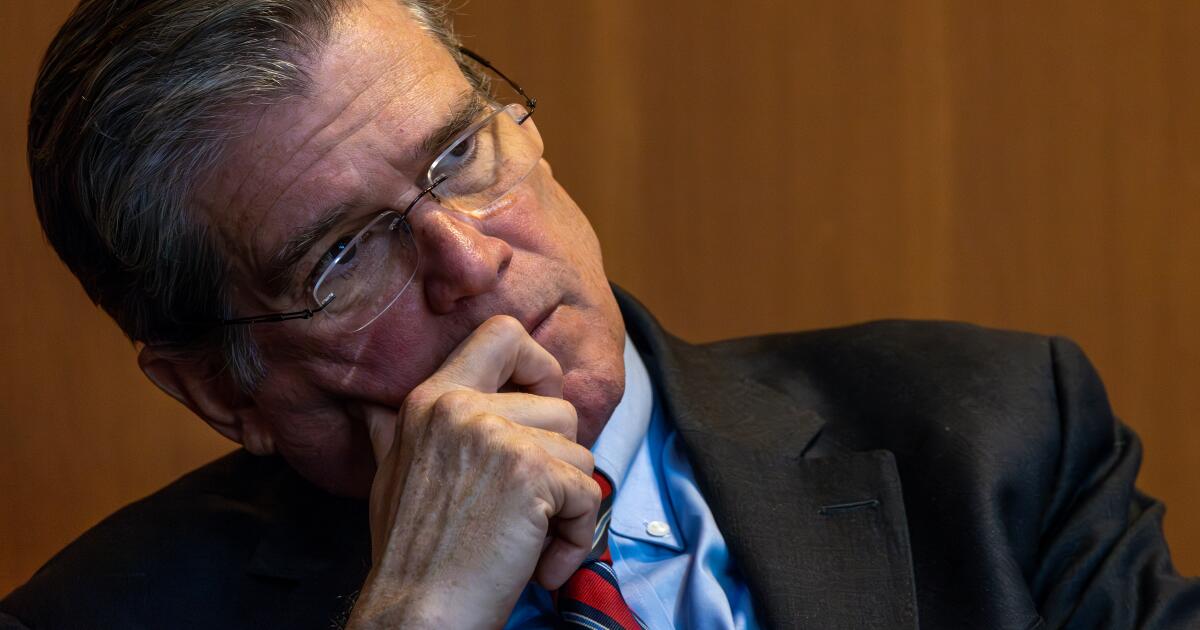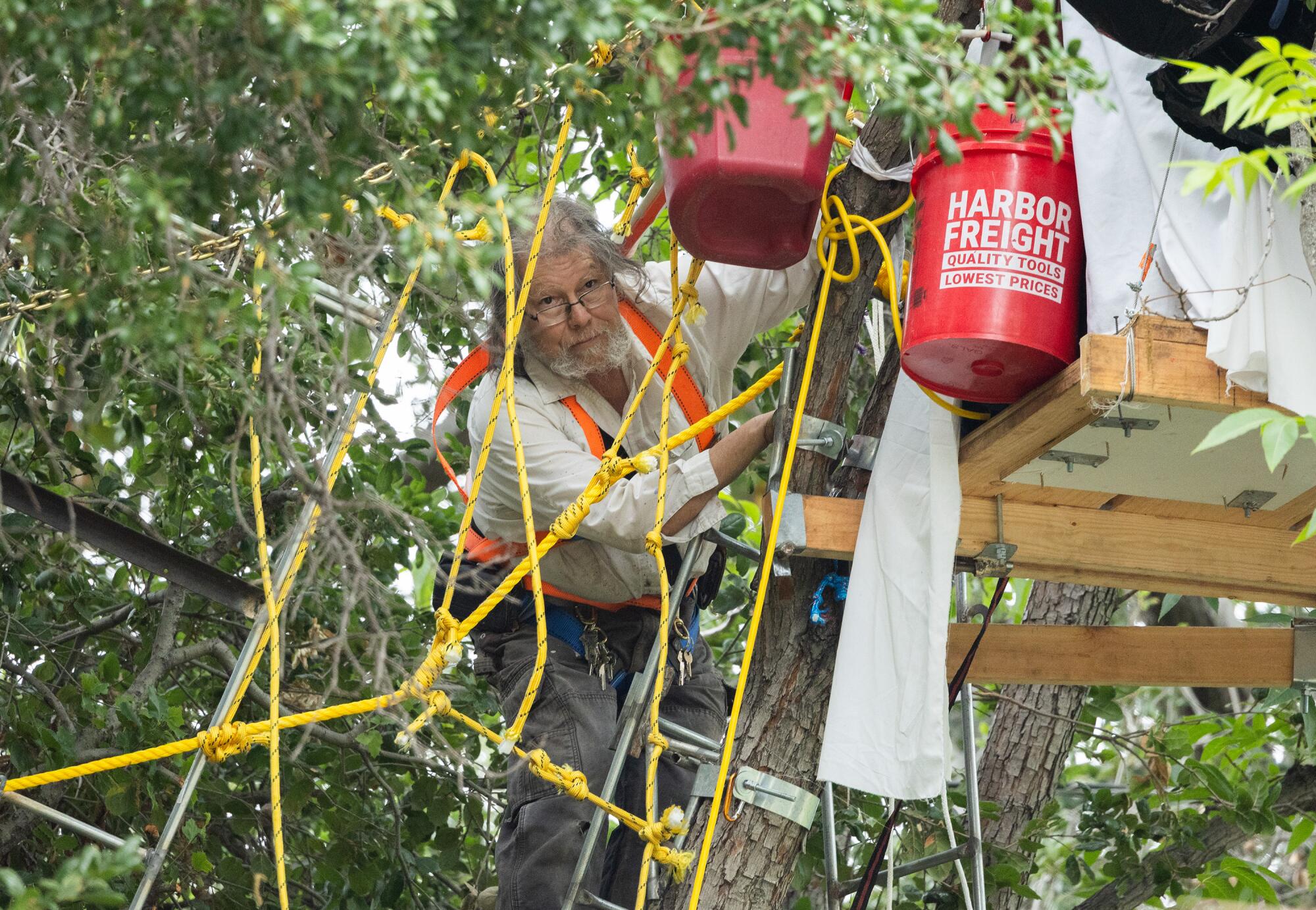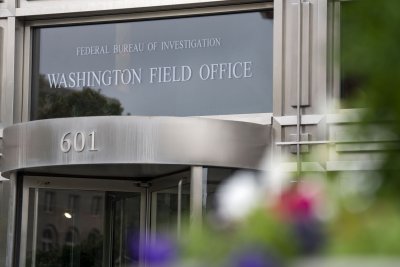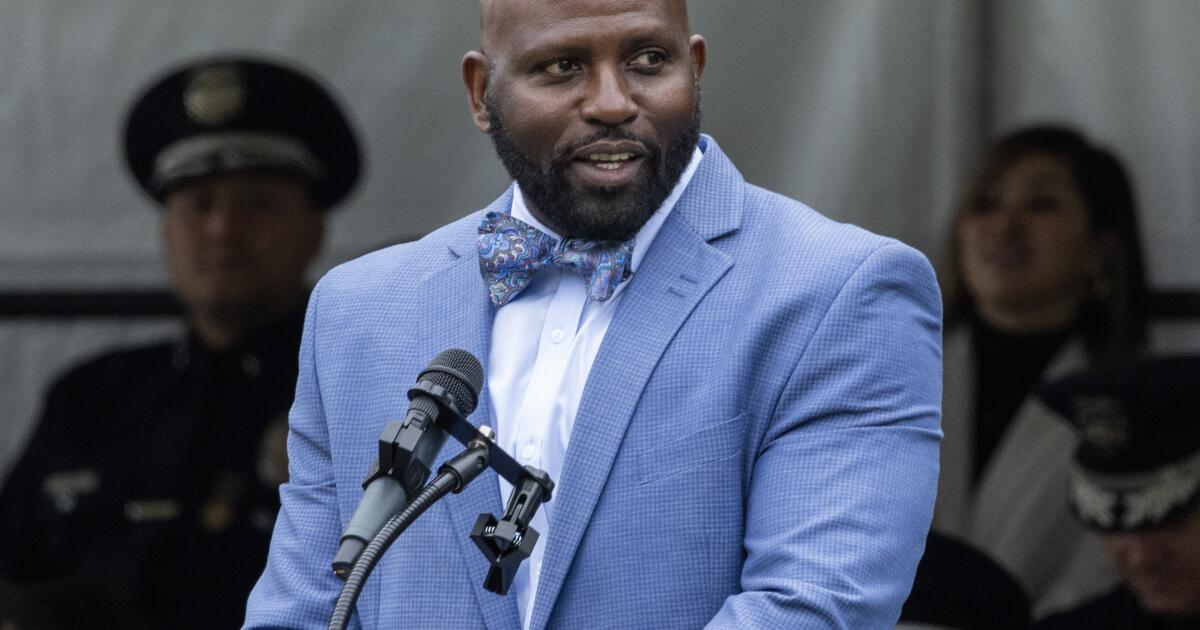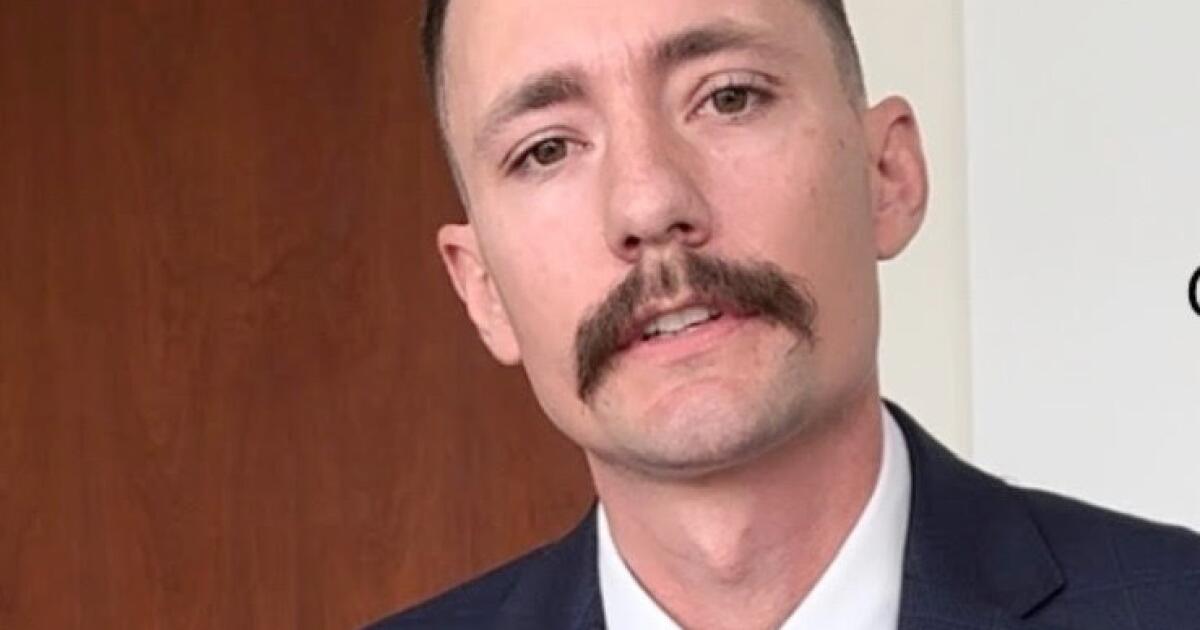Former L.A. County sheriff’s oversight official faces investigation
The former chairman of the Los Angeles County Sheriff Civilian Oversight Commission is under investigation for alleged retaliation against a Sheriff’s Department sergeant who faced scrutiny for his role in a unit accused of pursuing politically motivated cases.
Sean Kennedy, a Loyola Law School professor who resigned from the commission this year, received notification from a law firm that said it had “been engaged by the Office of the County Counsel to conduct a neutral investigation into an allegation that you retaliated against Sergeant Max Fernandez,” according to an email reviewed by The Times.
Kennedy and other members of the commission questioned Fernandez last year about his connections to the Sheriff’s Department’s now-disbanded Civil Rights and Public Integrity Detail, a controversial unit that operated under then-Sheriff Alex Villanueva.
Kennedy said the commission’s inquiry into Fernandez appears to be what landed him in the crosshairs of the investigation he now faces. Kennedy denied any wrongdoing in a text message Thursday.
“I was just doing my job as an oversight official tasked by the commission to conduct the questioning at an official public hearing,” he wrote.
Last week, Kennedy received an email from Matthias H. Wagener, co-partner of Wagener Law, stating that the county had launched an investigation.
“The main allegation is that you attempted to discredit Sergeant Fernandez in various ways because of his role in investigating Commissioner Patti Giggans during his tenure on the former Civil Rights & Public Corruption Detail Unit,” Wagener wrote. “It has been alleged that you retaliated for personal reasons relating to your relationship with Commissioner Giggans, as her friend and her attorney.”
The Office of the County Counsel confirmed in an emailed statement that “a confidential workplace investigation into recent allegations of retaliation” is underway, but declined to identify whom it is investigating or who alleged retaliation, citing a need to “ensure the integrity of the investigation and to protect the privacy of” the parties.
“In accordance with its anti-retaliation policies and procedures, LA County investigates complaints made by employees who allege they have been subjected to retaliation for engaging in protected activities in the workplace,” the statement said.
The Sheriff’s Department said in an email that it “has no investigation into Mr. Kennedy.”
Reached by phone Thursday, Fernandez said that he doesn’t “know anything about” the investigation and that he has not “talked to anybody at county counsel.”
“This is the first I’m hearing about it,” he said. “Who started this investigation? They haven’t contacted me. I don’t know how that got into their hands.”
In a phone interview, Kennedy described the inquiry as “extraordinary.”
“I think that this is just the latest in a long line of Sheriff’s Department employees doing really anything they can to thwart meaningful oversight,” Kennedy said. “So now we’re at the point where they’re filing bogus retaliation complaints against commissioners for doing their jobs.”
Kennedy resigned from the Civilian Oversight Commission in February after county lawyers attempted to thwart the body from filing an amicus brief in the criminal case against Diana Teran, who served as an advisor to then-L.A. County Dist. Atty. George Gascón.
The public corruption unit led several high-profile investigations during Villanueva’s term as sheriff, including inquiries into Giggans, the Civilian Oversight Commission, then-L.A. County Supervisor Shelia Kuehl and former Times reporter Maya Lau.
One of the unit’s investigations involved a whistleblower who alleged that the Metropolitan Transportation Authority unfairly awarded more than $800,000 worth of contracts to a nonprofit run by Giggans, a friend of Kuehl’s and vocal critic of Villanueva. The investigation made headlines when sheriff’s deputies with guns and battering rams raided Kuehl’s Santa Monica home one early morning in 2022.
The investigation ended without any criminal charges last summer, when the California Department of Justice concluded that there was a “lack of evidence of wrongdoing.”
Asked Thursday about the claim that Kennedy — who served as a lawyer for her while she was being investigated by the public corruption unit — interrogated Fernandez as a form of retaliation, Giggans called it “bogus” and said Fernandez “was subpoenaed because of his actions as a rogue sheriff’s deputy.”
Lau filed a lawsuit last month alleging the criminal investigation into her activities as a journalist violated her 1st Amendment rights. California Atty. Gen. Rob Bonta ultimately declined to prosecute the case against Lau.
Critics have repeatedly alleged that Villanueva used the unit to target his political enemies, a charge the former sheriff has disputed.
In October, Kennedy and other members of the Civilian Oversight Commission spent five hours interrogating Fernandez and former homicide Det. Mark Lillienfeld about the public corruption unit, of which they were members.
Kennedy questioned Fernandez’s credibility during the exchange, asking about People vs. Aquino, a ruling by an appellate court in the mid-2000s that found he had provided false testimony during a criminal trial that was “deliberate and no slip of the tongue.”
Fernandez argued that he had “never lied on the stand,” adding that “that’s ridiculous, I’m an anti-corruption cop.”
Fernandez also fielded questions about whether he was a member of a deputy gang. Critics have accused deputy cliques of engaging in brawls and other misconduct.
Fernandez said he was not in a deputy gang or problematic subgroup. But he acknowledged that he drew a picture of a warrior in the early 2000s that he got tattooed on his body.
A lieutenant tattooed with that image previously testified that it is associated with the Gladiators deputy subgroup, of which Fernandez has denied being a member.
Kennedy also asked Fernandez about a 2003 incident in which he shot and killed a 27-year-old man in Compton. Fernandez alleged the man pointed a gun at him, but sheriff’s investigators later found he was unarmed.
In a 2021 memo to oversight officials, Kennedy called for a state or federal investigation into the Civil Rights and Public Integrity Detail and its “pattern of targeting” critics of the Sheriff’s Department.
Then-Undersheriff Tim Murakami responded in a letter, writing that the memo contained “wild accusations.”
On May 30, Wagener questioned Kennedy about “why I examined Max Fernandez about his fatal shooting of a community member, his Gladiators tattoo, his perjury in People v. Aquino, and why he put references to people’s sexual orientation in a search warrant application,” Kennedy wrote in a text message Thursday. “I told him I was just asking questions that relate to oversight.”
Robert Bonner, chair of the Civilian Oversight Commission, provided an emailed statement that called the investigation into Kennedy “extremely troubling and terribly ironic.”
“The allegation itself is rich,” Bonner wrote. “But that [it is being] given any credence by County Counsel can only serve to intimidate other Commissioners from asking hard questions.”
